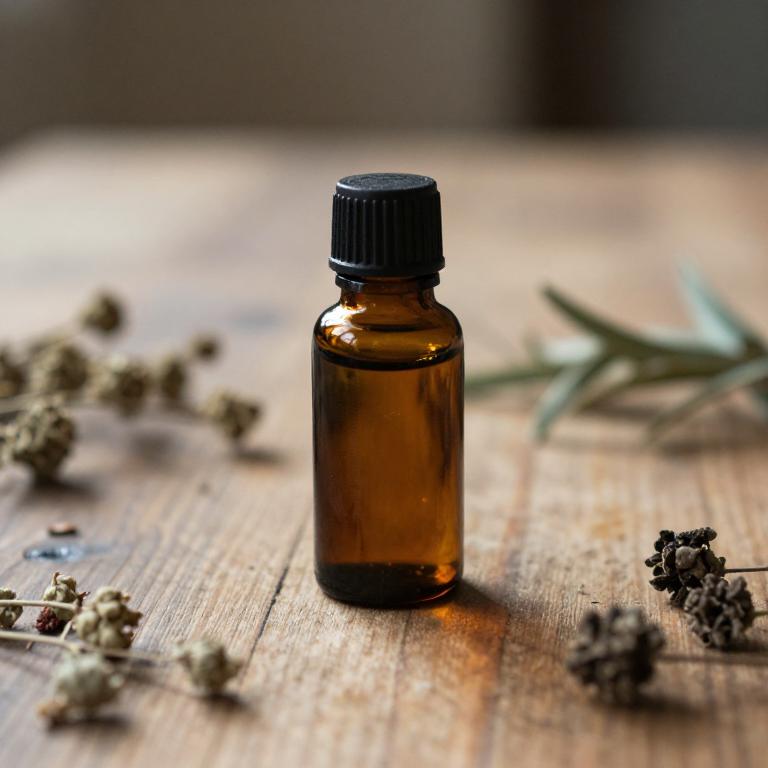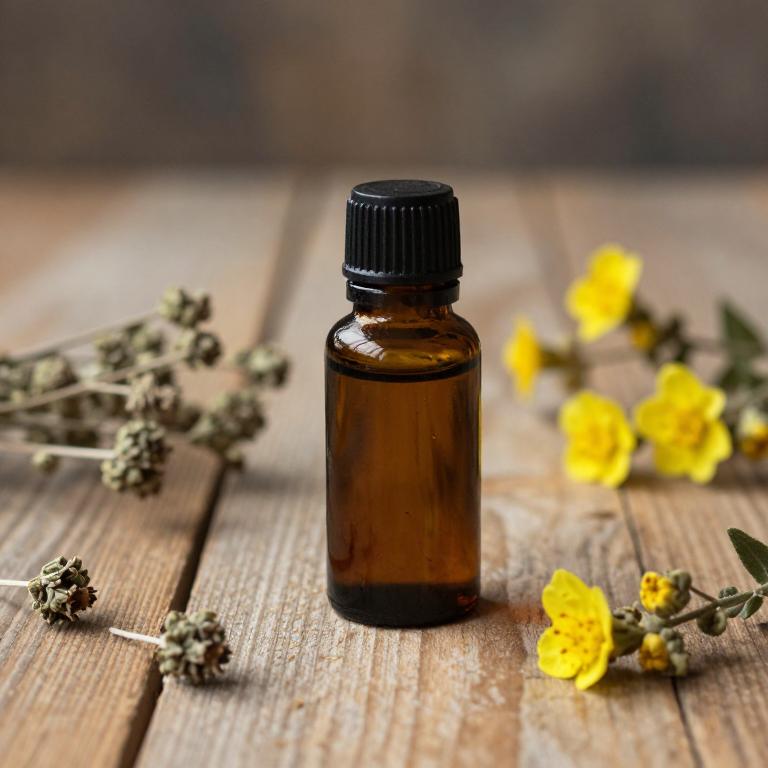10 Best Herbal Essential Oils For Dry Scalp

Herbal essential oils, such as tea tree, lavender, and rosemary, are widely used for their soothing and nourishing properties, making them effective natural remedies for dry scalp conditions.
These oils can help reduce inflammation, moisturize the scalp, and promote healthy hair growth by improving blood circulation. When diluted with a carrier oil like coconut or jojoba oil, they can be safely applied to the scalp to alleviate dryness and flakiness. Many people find that regular use of these essential oils provides long-term relief from dry scalp issues without the harsh side effects of chemical treatments.
Overall, herbal essential oils offer a gentle and holistic approach to managing dry scalp health.
Table of Contents
- 1. Melaleuca (Melaleuca alternifolia)
- 2. Rosemary (Rosmarinus officinalis)
- 3. English lavender (Lavandula angustifolia)
- 4. Eucalyptus (Eucalyptus globulus)
- 5. Ceylon cinnamon (Cinnamomum zeylanicum)
- 6. Lemon grass (Cymbopogon citratus)
- 7. Stinging nettle (Urtica dioica)
- 8. Thyme (Thymus vulgaris)
- 9. Salvia (Salvia officinalis)
- 10. Common teucrium (Teucrium marum)
1. Melaleuca (Melaleuca alternifolia)

Melaleuca alternifolia, commonly known as tea tree oil, is a popular essential oil derived from the leaves of the Melaleuca alternifolia plant, native to Australia.
It is widely recognized for its antimicrobial, anti-inflammatory, and antifungal properties, making it a valuable ingredient in natural remedies for various skin conditions, including dry scalp. When diluted properly, tea tree oil can help reduce dandruff, soothe irritation, and promote a healthier scalp environment. Its ability to combat fungal infections like dandruff and seborrheic dermatitis makes it an effective choice for those suffering from dry, flaky scalp issues.
However, it is important to use it in a properly diluted form to avoid skin irritation, as undiluted essential oils can be too strong for direct application.
2. Rosemary (Rosmarinus officinalis)

Rosmarinus officinalis, commonly known as rosemary, is a popular herb whose essential oil is widely used for its stimulating and therapeutic properties.
When applied to a dry scalp, rosemary essential oil can help improve blood circulation, which may promote healthier hair growth and reduce scalp dryness. Its antimicrobial and antifungal properties can also help combat dandruff and other scalp infections that contribute to dryness. To use it safely, the essential oil should be diluted with a carrier oil before applying to the scalp.
Regular use of rosemary essential oil in a scalp treatment may lead to improved moisture retention and overall scalp health.
3. English lavender (Lavandula angustifolia)

Lavandula angustifolia, commonly known as English lavender, is a popular herb used in the production of essential oils that are widely recognized for their soothing and therapeutic properties.
The essential oil derived from this plant is particularly beneficial for individuals suffering from a dry scalp due to its calming and anti-inflammatory effects. It helps to reduce irritation, redness, and itching associated with dryness by promoting a balanced scalp environment. Additionally, its antimicrobial properties can help prevent infections that may exacerbate scalp conditions.
When used in aromatherapy or diluted in a carrier oil and applied topically, lavender essential oil offers a natural and effective remedy for maintaining scalp health.
4. Eucalyptus (Eucalyptus globulus)

Eucalyptus globulus, commonly known as blue gum eucalyptus, is a popular source of essential oil that is often used for its aromatic and therapeutic properties.
The essential oil derived from this plant contains compounds like cineole and limonene, which are known for their antifungal and antimicrobial benefits. When used for dry scalp conditions, eucalyptus globulus essential oil can help reduce dandruff and soothe irritation due to its cleansing and cooling effects. It is typically diluted with a carrier oil before application to prevent skin irritation and ensure safe use.
Overall, this essential oil can be a valuable natural remedy for those seeking relief from dry, flaky, or itchy scalp issues.
5. Ceylon cinnamon (Cinnamomum zeylanicum)

Cinnamomum zeylanicum, commonly known as cinnamon bark, produces a rich and aromatic essential oil that is widely used in natural remedies for various skin and scalp conditions.
This essential oil is particularly beneficial for individuals suffering from a dry scalp due to its potent antimicrobial and anti-inflammatory properties, which help reduce fungal infections and soothe irritation. The warming and stimulating aroma of cinnamon oil can also promote blood circulation to the scalp, enhancing overall scalp health and potentially reducing dandruff. When diluted properly with a carrier oil, cinnamon essential oil can be safely applied to the scalp to provide relief from dryness and itching.
Its versatility makes it a valuable addition to a holistic approach for maintaining a healthy, moisturized scalp.
6. Lemon grass (Cymbopogon citratus)

Cymbopogon citratus, commonly known as lemongrass, is a herb widely used in aromatherapy and natural remedies due to its refreshing citrus scent and therapeutic properties.
Its essential oil is particularly beneficial for individuals suffering from dry scalp, as it possesses antimicrobial and anti-inflammatory properties that help reduce dandruff and irritation. The oil's ability to stimulate blood circulation in the scalp can enhance hair growth and improve overall scalp health. When diluted with a carrier oil, lemongrass essential oil can be safely applied to the scalp to soothe dryness and promote a healthier environment for hair growth.
Regular use of this essential oil may provide long-term relief from dry scalp conditions while offering a natural and aromatic alternative to conventional treatments.
7. Stinging nettle (Urtica dioica)

Urtica dioica, commonly known as stinging nettle, contains bioactive compounds that may support scalp health when used in the form of essential oils.
These oils are derived from the leaves and stems of the plant and are often diluted with a carrier oil before application to the scalp. The anti-inflammatory and antimicrobial properties of stinging nettle essential oil may help reduce scalp irritation and dandruff, making it a potential natural remedy for dry scalp conditions. Regular use of diluted urtica dioica essential oil can promote improved circulation to the scalp and enhance moisture retention.
However, it is important to perform a patch test and consult with a healthcare professional before incorporating it into a scalp care routine.
8. Thyme (Thymus vulgaris)

Thymus vulgaris, commonly known as thyme, is a popular herb used in aromatherapy and natural remedies for its potent essential oil, which is known for its antimicrobial and antifungal properties.
When used for dry scalp treatment, thyme essential oil can help reduce fungal infections and inflammation that often contribute to dryness and flakiness. However, due to its strong potency, it should always be diluted with a carrier oil before applying to the scalp to prevent irritation. The oil's warming effect can also stimulate blood circulation, promoting healthier hair growth and improving overall scalp health.
Incorporating thyme essential oil into a regular scalp care routine may offer a natural and effective solution for managing dry scalp conditions.
9. Salvia (Salvia officinalis)

Salvia officinalis, commonly known as sage, is a versatile herb that produces essential oils with potent therapeutic properties.
These oils contain compounds like thujone, camphor, and cineole, which have antimicrobial and anti-inflammatory effects, making them beneficial for scalp health. When used in diluted form, sage essential oil can help alleviate dry scalp by reducing irritation and promoting a balanced scalp environment. It is often blended with carrier oils such as jojoba or almond oil to ensure safe application.
Regular use of sage essential oil in scalp treatments may help improve moisture retention and reduce dandruff, offering a natural alternative for those seeking relief from dry scalp conditions.
10. Common teucrium (Teucrium marum)

Teucrium marum, also known as germander, contains essential oils that have been traditionally used for their soothing and anti-inflammatory properties, making them beneficial for individuals with a dry scalp.
The essential oils derived from this plant may help reduce scalp irritation and promote a healthier scalp environment by balancing oil production and enhancing moisture retention. These oils often contain compounds like thymol and carvacrol, which possess antimicrobial and antifungal properties that can combat scalp infections. When used in diluted form, they can be safely incorporated into scalp treatments or essential oil blends to alleviate dryness and itching.
However, it is important to consult with a qualified aromatherapist or healthcare provider before using these oils to ensure proper dilution and safe application.